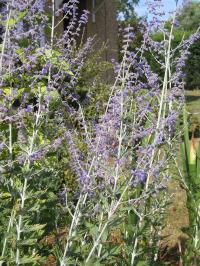A walk in the park for Perovskia

A plant profile of Perovskia 'Blue Spire', particularly suitable to the current UK climate and our preferred method of pruning Hypericum 'Hidcote' (St John's Wort).
Temperatures touching 37 C, very little rain, sun-baked, very free draining soil. It's all as easy as a walk in the park for Perovskia 'Blue Spire', a plant that flowers in many gardens during the summer.
If you are currently in the process of redesigning your garden, trying to choose drought tolerant plants that will cope with long, hot summers and reduced rainfall. I would suggest that you consider adding Perovskia 'Blue Spire' to the list. If everybody planted their gardens with plants like this the water companies would file for bankruptcy!
Also commonly known as Russian Sage, Perovskia 'Blue Spire' is a very distant relative of the nettle group of plants. I suppose you could describe it as looking a little like Lavender, it has a lot in common with Lavender as well. It has grey-green leaves that are finely cut, almost to the mid-rib. The leaves are strong>fragrant (the common name is probably a reference to the Sage-like fragrance of the leaves) and only about 5 cm long, they remind me a bit of mini fern or bracken leaves.
Perovskia 'Blue Spire' has an upright habit, it has tall, almost white stems that are clothed with leaves on the bottom part of the plant. On the topmost 30 - 40 cm section of the same stems many tiny, cylindrical blue-violet flowers are produced, each one has a prominent "lip". The flowers are produced from mid-summer and into autumn. The maximum height and spread of Perovskia 'Blue Spire' is 1.3 m and 1 m respectively.
Perovskia 'Blue Spire' is classed as a sub-shrub. What on earth is a sub-shrub? I hear you ask. Well, the best way to describe a sub-shrub is to say that they have a woody base, but as you work vertically up the plant the stems become a lot softer.
In the wild, Perovskia species would be found growing on poor, rocky soil in the Himalayas and Central Asia. In this country, we are constantly told about the benefits of adding organic matter such as compost or manure to the soil. However, there are some plants that simply don't need it. If you were to add muck or manure to the soil when planting Perovskia 'Blue Spire' I suspect that flowering performance would be lost to excessive foliage growth, this plant thrives on poor, nutrient deficient, free-draining soil. Sometimes it is best to ignore the conventional, general gardening advice and think about the specific needs and characteristics of the plant.
Pruning Perovskia 'Blue Spire' is easy, prune at the same time as Buddleja and Cornus in early spring, and in the same way, hard back to basal shoots.
Pruning St John's Wort
Another plant that will tolerate a really brutal "hair cut" is Hypericum 'Hidcote'. Hypericums are commonly known as St John's Wort. I have an informal hedge of Hypericum 'Hidcote' in my garden and every year in July, immediately after it has finished flowering I prune it really hard, cutting it back from 3ft to 3 inches. It is an amazingly robust plant, I leave it without any leaves at all and within 2 - 3 weeks new foliage quickly sprouts. I use this technique because the result is loads of new wood that will, next summer, produce a spectacular floral display.
Apart from when I have just pruned it, Hypericum 'Hidcote' is usually evergreen, although it is sometimes described as semi-evergreen in some text books. I understand it gets it's name because it was first propagated at Hidcote Manor Gardens in Gloustershire. It is thought to be a cross between Hypericum x cyathiflorum 'Gold Cup' and H. calcinum.
You can find out more about both Perovskia 'Blue Spire' and Hypericum 'Hidcote' by visiting the our Plant Database and looking in the Shrubs section.
Other Jobs to do during July are:
- Making sure all water butts are working properly and free of any blockages in the supply pipe-work
- Harvesting courgettes
- Dead-heading, weeding and feeding
- Pruning Cistus and Hebe plants that have just finished flowering
Filed under General.
